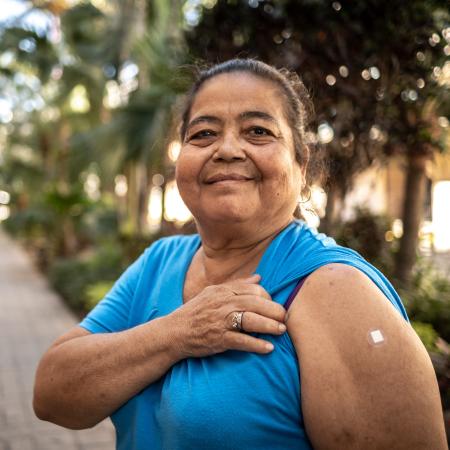Participation by people of all backgrounds is critical to developing vaccines that protect against serious pneumococcal diseases. The greater the diversity among clinical trial participants, the more we can learn about potential vaccines and how they work for different people, including those most at-risk because of their age, race, ethnicity, or where they live. Each new vaccine breakthrough helps us reach more people to prevent and reduce the spread of disease.
Adults 65 years of age and older are more likely to experience pneumococcal infections, and to have serious infections with complications.
The pneumococcal vaccines available today have been proven safe and effective, dramatically reducing rates of serious pneumococcal disease. However, while they defend against many strains of pneumococcal bacteria, they don’t protect against all.
That’s why we are working to develop a vaccine that aims to expand protection against more bacterial strains than the current pneumococcal vaccines and improve the immune response (the amount of antibodies made).
Who may participate
We’re enrolling adults 65-84 years old who:
- Have either never received a pneumococcal vaccine or received the PNEUMOVAX® 23 vaccine more than 5 years ago
- Have never been diagnosed with an invasive pneumococcal disease such as pneumococcal sepsis, pneumonia or meningitis
- Are generally healthy or have stable chronic conditions
There are other requirements for participation that the trial team can discuss with you.
Condition
Pneumococcal disease
Age
65 to 84 years
Medical and vaccination history
Either never received a pneumococcal vaccine or received the PNEUMOVAX® 23 vaccine more than 5 years ago
Each clinical study has its own guidelines for who can participate, called eligibility criteria. However, only the research study staff can determine if you qualify to enroll in the study.
What to expect
If this clinical trial is a good fit for you and you agree to take part, you’ll be randomly assigned to receive either two doses of the study vaccine combined with one of two different components designed to strengthen the immune response, or a single dose of one of two controls (the study vaccine without either component, or Pfizer's licensed pneumococcal vaccine Prevnar 20®).
The trial will last about 14 to 18 months and will require 9 clinic visits.
Before joining the trial, you’ll be given all the details about participation, including potential benefits and risks. Your health will also be carefully monitored throughout this trial by your clinical trial team.
There’s no cost to participate, and health insurance isn’t required. You’ll also be compensated for completing trial-related activities.
Number of vaccine doses
Up to 2 doses
Visit schedule
About 9 clinic visits over 14 to 18 months
Study-related costs
No cost to participate, and you will be paid for your time and effort.
Watch a short video to learn more about pneumococcal disease
You can make a difference
You can make a difference


Frequently asked questions
Participants will be randomly assigned to receive two doses of either the study vaccine with a component to help it work better or a single dose of the study vaccine without the component or Pfizer's licensed pneumococcal vaccine Prevnar 20® followed by a dose of placebo.
Most study visits last for about one hour.
As with any vaccine, local reactions at the injection site can be common – such as redness, swelling, or pain. There is also potential for other symptoms like a mild fever, headaches, muscle aches, joint aches, or fatigue. The known side effects will be further explained in the informed consent document and discussed with you by the study doctor before you join the study. If there is any new information that we learn about the study vaccine during the clinical trial, the study doctor will share that with you as well.
At the beginning of the clinical trial, the study doctor will ask you about your medical history, and any medications you are taking. You will be given an electronic diary to complete for at least one week after each of your vaccinations so the study team can monitor your health. You will also have your blood drawn at each study visit. The study team will give you more information about the tests and procedures during the review of the study’s informed consent document.



